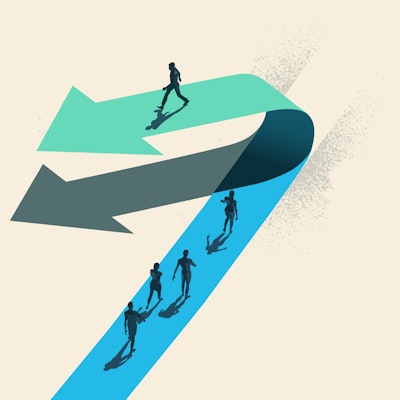
Can We Spend Our Way to Happiness?
Setup
It’s hard to be dispassionate about money. Whether we have a lot, not enough, or a comfortable amount of it, our emotional relationship with money is often fraught. Fascinating research on this subject reveals that luxury cars often provide no more pleasure than economy models, that commercials can actually enhance the enjoyment of watching television, and that residents of many cities frequently miss out on inexpensive pleasures in their hometowns. How can we change the way we think about money?
Buy your way out of the things you hate doing
When your paycheck grows and you take on more responsibility at work, it’s likely you feel more pressed for time. Elizabeth Dunn, professor of psychology at the University of British Columbia, says as people become wealthier they feel their time is short. “When our time becomes worth a lot of money, it can make us feel like we don’t have enough of it.” It’s because of a perceived association between scarcity and value. “Financial affluence can erode our sense of time affluence,” says Dunn.
If you feel pressed for time, how can you find more happiness? Dunn says pay someone to do the tasks you hate doing. In a study of 800 millionaires in the Netherlands, half said they weren’t paying for help with things they didn’t like doing. “It suggests there’s this unrealized opportunity for people to buy their way out of the stuff that brings them down,” Dunn says. It could be cooking, cleaning, washing the dog — you name it! “If you can buy your way out of the most negative parts of your day, our research shows that’s a good strategy for promoting happiness.”
Driving your way to happiness: public vs. private consumption
Imagine you’re in a high-tax world and a low-tax world, and in both worlds you’re shopping for a car. Robert Frank, professor of management and economics at Cornell, says a low-tax world resident might have the means to buy a Ferrari but when he takes it for a spin, the road may be rough. In the high-tax world, the car a consumer purchases may not be as fancy but “at least some of that extra money is going to be spent on public investment so the roads will be maintained. So the real question is who’s happier — people in the high or low tax world? The people in the high tax world are happier because their roads aren’t riddled with potholes,” says Frank.
Big IdeaThe mix of private and public consumption is one of the main determinants of differences in cross-country happiness.Robert Frank
Getting tired of your latest buy? Take a break from it.
Are you already over the shoes you purchased last month? You’re not alone. Elizabeth Dunn says we adapt to the things we typically buy. “So the trick,” she says, “is to spend money in ways that slow down the pace of what we call hedonic adaptation, or this ability to get used to whatever we have.” If you’re intentional about taking a break, you’ll save and spend your money in more strategic ways. “If you choose to go back to [the item you purchased], you’ll be able to approach it with fresh eyes that can appreciate it the way you did originally.”
The happiness trifecta
Happiness includes three key components, according to researcher Elizabeth Dunn. The first: life satisfaction. “Are you living the life you want to be living?,” she asks. Secondly, how much positive emotion are you experiencing on a day to day basis? Are you laughing and smiling? Finally, says Dunn, how much negative emotion are you experiencing? “We would never say that to be happy, you need to never experience negative emotions. Everybody experiences negative emotion.”
Big IdeaPeople who score high on this overall measure of happiness are those who are experiencing a preponderance of positive emotions relative to negative emotions, and who feel this satisfaction with their lives. In general, these three components are like the triumvirate of happiness.Elizabeth Dunn
Learn More
Additional Information
Resources
Luxury Fever: Weighing the Cost of Excess
Happy Money: The Science of Happier Spending
Five ways money can buy you happiness
Explore More
Society


While the workforce continues to evolve in response to economic shifts and technological advancements, one thing is certain — the traditional blueprints for education and the...


Living as a trans person in America comes with its share of challenges, which are sometimes even life-threatening. But some say it can also open up access to incredible freedo...

Entrepreneurs view the world differently. Where others see challenges, they see opportunities. They’re a group of self-starters and strivers with the courage to take big risks...

Global conflicts and health crises have put into stark relief deeply-ingrained gender roles in society. Yet the past years have also seen record-high numbers of women running...

The people in our lives shape who we are. But great relationships don’t just happen — they take care, intention, and ongoing effort. How do you know when to let go, adjust exp...


Advances in medicine and healthy living mean that more and more people will live to be 100. But just because their bodies can last doesn’t mean their bank accounts will keep u...


In the early days of cable television, there wasn’t a single network aimed at Black audiences. Sheila Johnson and her husband at the time saw an opening, and put all their hop...


Owning a professional sports team is not for the faint of heart. Results are volatile and wins and losses come with the strong emotions of a city’s fan base. But it’s a sound...


Looking around and experiencing the suffering and injustice in the world can make it difficult to believe that happiness exists. But the Judeo-Christian tradition teaches that...


This episode is from the 2022 Aspen Ideas Festival, but we’re bringing it back because it’s still as relevant as ever. Though it can sometimes feel like conflict and discord i...


Sir Ken Robinson believed that as a society, we tragically underestimate and underutilize human ability. We create linear systems for our minds modeled on industry and manufac...


Young people in America are struggling. The causes are varied and may not be entirely clear, but the results are unfortunately unmistakable. Many of our youth feel lonely, iso...

New York Times columnist and bestselling author David Brooks is known for bringing his thoughtful reflections on politics and culture, but at this year’s Aspen Ideas Festival,...

Jump in by watching our 15 most popular talks of all time. From black holes to jazz and civil rights to psychology hacks, we've collected the talks that remain audience favori...

Finding the national and global headlines understandably bleak lately? Whether you need mental distraction or stimulation, engross yourself in compelling topics and get a gli...

The United States spends $4.3 trillion—almost one fifth of the nation’s GDP—on health care. As the scale of the medical enterprise expands, venture capitalists are pursuing th...

Today's kids are coming of age against a backdrop of political, social, technological and economic upheaval. While these circumstances are shaping a precocious generation that...


Hope seems like a simple concept, but the feeling can be difficult to hold onto. And when times are difficult and chaos swirls around us, it’s more important than ever. How do...

Advocates, healthcare providers, legislators, researchers, and venture capitalists are bringing the unique health needs of women to light – from vigorous policy debates on iss...

Ethical dilemmas, stakeholder pressure, building trust — leading organizations requires wisdom and stamina from the top. Who wouldn’t want some advice?













